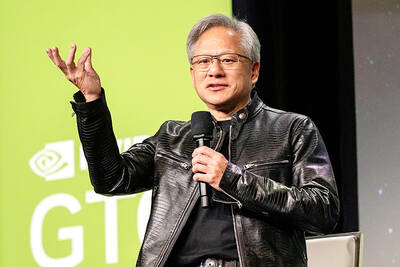Most members of the US Federal Reserve’s rate-setting committee said it would likely be “appropriate” to cut interest rates next month when they met last month, the US central bank said on Wednesday.
“The vast majority observed that, if the data continued to come in about as expected, it would likely be appropriate to ease policy at the next meeting,” the US central bank announced in the minutes of its rate decision last month.
The minutes published on Wednesday would likely fuel expectations that the Fed would implement its first interest cut this cycle when policymakers meet next month, starting its long path to easing monetary policy.

Photo: Bloomberg
Futures traders are now wholly convinced of a rate cut next month and waiting with anticipation for remarks on Friday from Fed Chairman Jerome Powell, hoping for clues about the future path — and scope — of rate cuts.
Although last month’s decision to keep rates on pause was unanimous, the Fed on Wednesday said that “several” committee members had observed that recent inflation progress and rising unemployment, “provided a plausible case for reducing the target range 25 basis points at this meeting or that they could have supported such a decision.”
The Fed has held its key lending rate at a 23-year high of between 5.25 and 5.50 percent for more than a year now, as it battles to return inflation to its long-term target of two percent.
In recent months, the Fed’s favored measure of headline inflation has slowed to an annual rate of 2.5 percent, while the unemployment rate has jumped to 4.3 percent — up sharply from recent prints, but still low by historical standards.
Separately, Bank of Japan (BOJ) Governor Kazuo Ueda would face intense market scrutiny today after the central bank’s rate hike and his clear hawkish signals contributed to a meltdown in global financial markets earlier this month.
Ueda is scheduled to respond to questions from lawmakers in the lower house of parliament from 9:30am, followed by another session in the upper house starting at 1pm. Each session is set to last two-and-a-half hours.
The unusual hearing, taking place when the broader parliament is not in session, was called by lawmakers insisting on an explanation from the BOJ.
Hawkish signals from the central bank contributed to a market rout that wiped out as much as US$6.4 trillion from global stock markets this month, including the biggest plunge on record for the Nikkei 225 index. Markets later pared losses, with the S&P 500 back within sight of its record high last month and the Nikkei up about 20 percent from its low earlier this month.
Speaking hours before a speech by Powell at Jackson Hole, Ueda’s likely aim is to generate as little news and volatility as possible. He would likely make no policy commitment, while giving assurances that there would not be a rate hike when financial markets are unstable, BOJ watchers said.
“Ueda’s ultimate goal is to create no shock,” NLI Research Institute senior economist Tsuyoshi Ueno said. “The very reason this hearing is happening is because of the global market turmoil that followed the BOJ’s hawkish turn. If Ueda creates further chaos, that would be a nightmare for the central bank.”
Additional reporting by Bloomberg

‘DECENT RESULTS’: The company said it is confident thanks to an improving world economy and uptakes in new wireless and AI technologies, despite US uncertainty Pegatron Corp (和碩) yesterday said it plans to build a new server manufacturing factory in the US this year to address US President Donald Trump’s new tariff policy. That would be the second server production base for Pegatron in addition to the existing facilities in Taoyuan, the iPhone assembler said. Servers are one of the new businesses Pegatron has explored in recent years to develop a more balanced product lineup. “We aim to provide our services from a location in the vicinity of our customers,” Pegatron president and chief executive officer Gary Cheng (鄭光治) told an online earnings conference yesterday. “We

LEAK SOURCE? There would be concern over the possibility of tech leaks if TSMC were to form a joint venture to operate Intel’s factories, an analyst said Taiwan Semiconductor Manufacturing Co (TSMC, 台積電) yesterday stayed mum after a report said that the chipmaker has pitched chip designers Nvidia Corp, Advanced Micro Devices Inc and Broadcom Inc about taking a stake in a joint venture to operate Intel Corp’s factories. Industry sources told the Central News Agency (CNA) that the possibility of TSMC proposing to operate Intel’s wafer fabs is low, as the Taiwanese chipmaker has always focused on its core business. There is also concern over possible technology leaks if TSMC were to form a joint venture to operate Intel’s factories, Concord Securities Co (康和證券) analyst Kerry Huang (黃志祺)

It was late morning and steam was rising from water tanks atop the colorful, but opaque-windowed, “soapland” sex parlors in a historic Tokyo red-light district. Walking through the narrow streets, camera in hand, was Beniko — a former sex worker who is trying to capture the spirit of the area once known as Yoshiwara through photography. “People often talk about this neighborhood having a ‘bad history,’” said Beniko, who goes by her nickname. “But the truth is that through the years people have lived here, made a life here, sometimes struggled to survive. I want to share that reality.” In its mid-17th to

‘MAKE OR BREAK’: Nvidia shares remain down more than 9 percent, but investors are hoping CEO Jensen Huang’s speech can stave off fears that the sales boom is peaking Shares in Nvidia Corp’s Taiwanese suppliers mostly closed higher yesterday on hopes that the US artificial intelligence (AI) chip designer would showcase next-generation technologies at its annual AI conference slated to open later in the day. The GPU Technology Conference (GTC) in California is to feature developers, engineers, researchers, inventors and information technology professionals, and would focus on AI, computer graphics, data science, machine learning and autonomous machines. The event comes at a make-or-break moment for the firm, as it heads into the next few quarters, with Nvidia CEO Jensen Huang’s (黃仁勳) keynote speech today seen as having the ability to